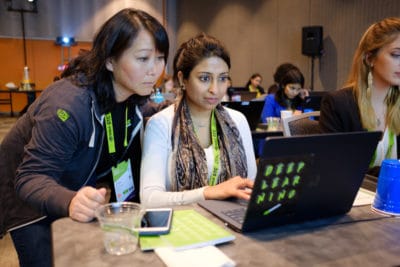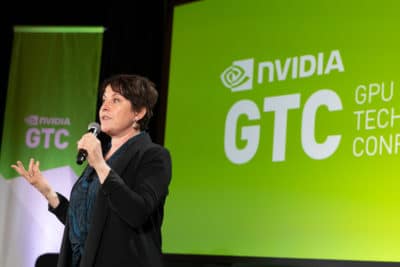A full day steeped in deep learning training isn’t everyone’s ideal Sunday.
But for 50 women working in healthcare, space research, agriculture and media, it was an opportunity to participate in NVIDIA’s first Women’s Early Career Accelerator program. The daylong, invite-only event featured a packed schedule of guest speakers, networking and hands-on AI training.
The program kicked off the most diverse GPU Technology Conference yet — more than 120 female presenters are speaking at the conference, up 40 percent from last year. GTC is among America’s top conferences for women to attend to further their careers in AI, according to a recent report in Forbes.
NVIDIA sponsored GTC attendance this year for a record number of developers from underrepresented groups. Women make up about 15 percent of the show’s attendees this year, double that of just four years ago.
“When you’re a woman in tech, you spend a lot of time in male-dominated spaces,” said Latoya Peterson, a self-described “executive in transition” who joined the accelerator program. “Sometimes it’s nice to have a break, step into a space and say ‘Okay, maybe I’m the only one at my job, but here I am not the only one.’”
Paving the Path for AI’s Next Leaders

The Women’s Early Career Accelerator, sponsored by Booz Allen Hamilton, brought together a mix of students and professionals from the U.S., Mexico, and Canada. Designed for those just getting started in AI, the program took participants through the NVIDIA Deep Learning Institute’s Fundamentals of Deep Learning for Computer Vision workshop, which teaches the basics of working with neural networks.
Peterson, who is interested in AI in the entertainment industry, said she was looking for structured learning in AI — without spending years pursuing an advanced engineering degree.
“I was thrilled to get into the accelerator because it’s direct hands-on training,” she said. “It’s one thing to be at your home trying to learn online, or going to meetups, and it’s another thing to actually have led instruction. That’s hugely valuable, especially if you’re not super technical.”
An an evening event open to all women attending GTC, Amy Bunszel, a senior vice president at Autodesk, shared her journey navigating the twists and turns of being a woman in tech.
“There’s no need to obsess about finding that first perfect job. Or if you’re getting your first job in AI, maybe it is not necessarily going to be perfect,” she told the group. “But I guarantee you, it will teach you something about yourself.”
Bunszel concluded by giving three pieces of advice to attendees: step out of your comfort zone, embrace feedback, and invest in relationships.

After the talk, attendees mingled at a reception, snacking on appetizers as they discussed their varying fields of work and the sessions they planned to attend later in the week.
“We want more women in AI because diversity breeds innovation,” said Tonie Hansen, NVIDIA’s senior director of corporate social responsibility. “There’s really no perfect path to AI except the one that you’re on. Everyone’s coming to it from different backgrounds — and that diversity is critical to solving the world’s most challenging problems through technology.”
From Healthcare to Cybersecurity, a Spectrum of Sessions
Throughout the week, women speakers are leading GTC sessions on topics as diverse as genomics, architecture and chemistry.
In one of more than 40 healthcare sessions, Rima Arnaout presented on work by the University of California, San Francisco, shared how she’s using NVIDIA GPUs and AI for cardiovascular imaging and diagnosis.
MIT research associate Pinar Yanardag spoke about AI-augmented creativity, describing her projects cooking, designing couture dresses and creating a scent inspired by AI-generated content.
Julie Zhu, distinguished engineer and chief data scientist at Optum, will present on UnitedHealth Group’s work developing deep learning models for prior authorization of medical procedures.
Also coming up: a talk by Nicole Nichols, senior research scientist at the U.S. Department of Energy’s Pacific Northwest National Lab, speaking on how natural language processing can be applied for detecting malicious activity in cyber event logs.
Breakfast Panel Discusses Diversity in AI
More than 150 attendees gathered at the Fairmont Hotel in downtown San Jose for our sixth annual Women@GTC event — a networking breakfast and discussion focused on AI for healthcare, as well as diversity and social impact in AI.
Kimberly Powell, NVIDIA’s vice president of healthcare, moderated a panel featuring four experts at the forefront of AI and medicine, from entrepreneurs like CloudMedx cofounder Sahar Arshad to Elizabeth Jones, director of radiology and imaging sciences at the National Institutes of Health.
In a wide-ranging conversation, the panelists discussed what it takes to make AI-powered healthcare a reality.
“I think we are just so early in this journey, that just getting an algorithm to market is not the end game,” Powell said. “That’s why AI is so exciting. There’s just no end in possibilities, no end in the work that needs to be done.”
For AI to become integrated into existing healthcare systems, “it has to be invisible, it has to be seamless,” said Karley Yoder, director of product management and artificial intelligence at GE Healthcare. “That only happens when you build AI well, but deploy it even better.”
The breakfast concluded with a talk by Laura Montoya, co-chair of LatinX in AI and cofounder of Accel.AI, a nonprofit focused on ethical AI development and lowering barriers to entry in engineering and AI.
“We strongly believe that you have to align the creation of AI with values,” she said. “Organizations should ensure human wellbeing, empowerment, and freedom are at the core of the AI technology that they develop.”